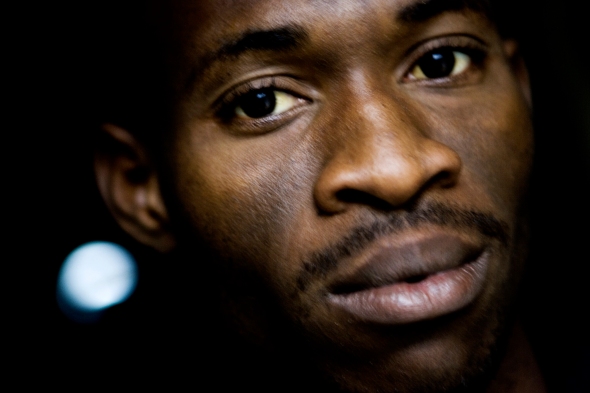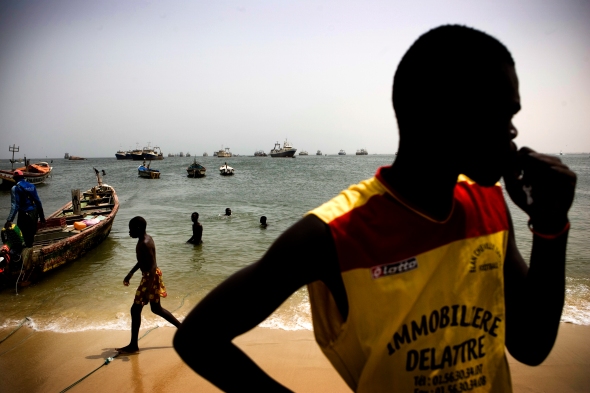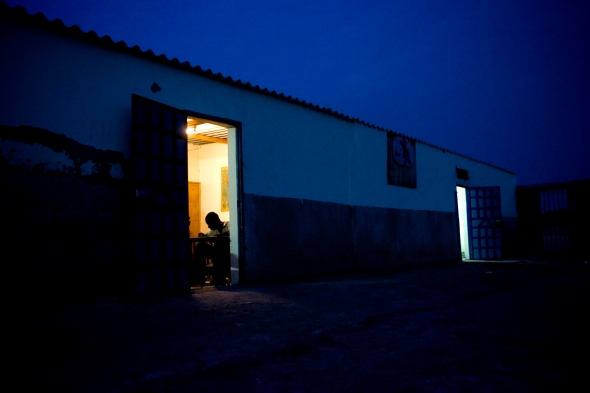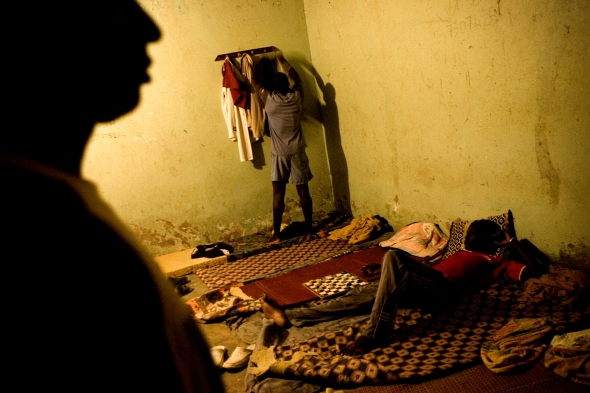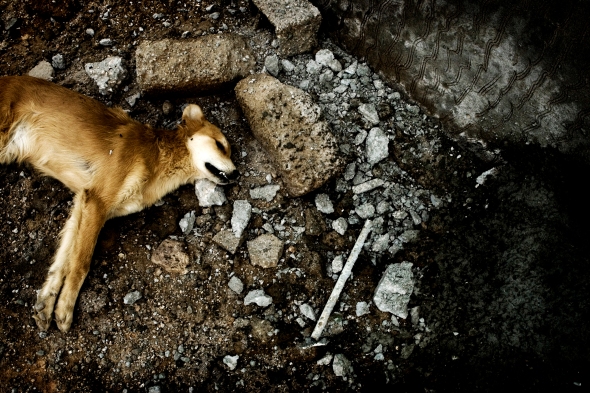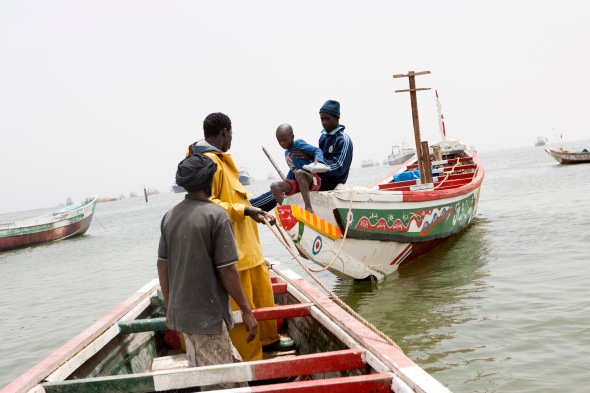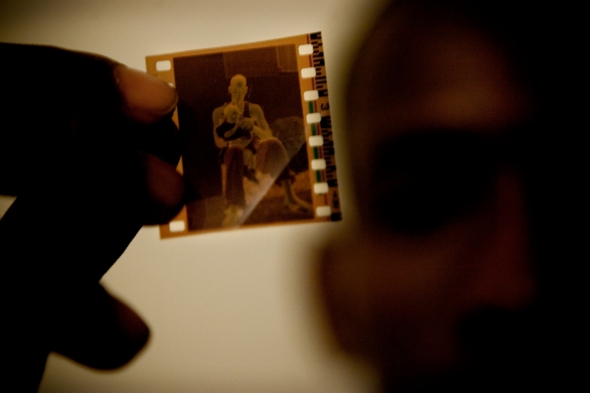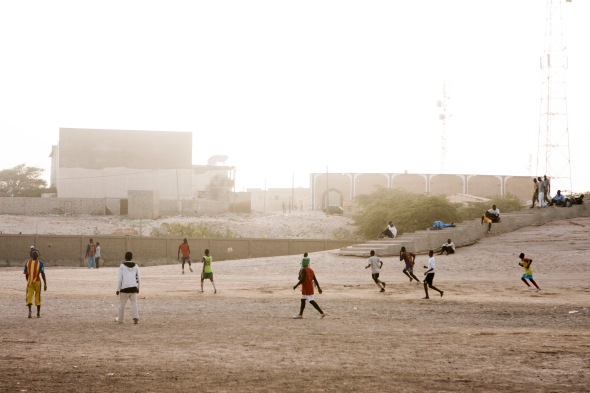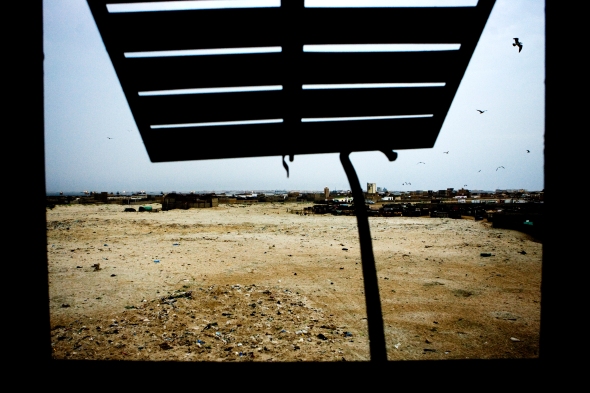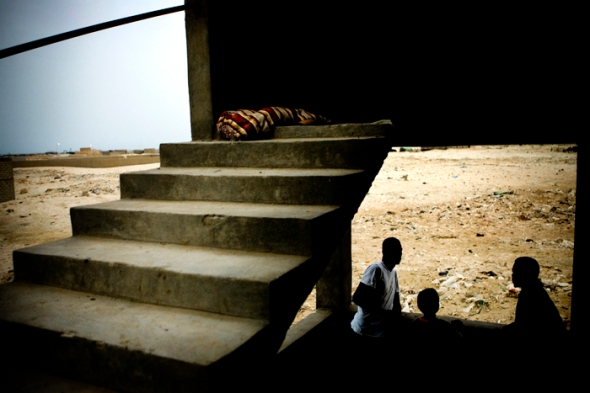The Invisible Ones – The story of a capsizing

The story of a capsizing
This is an extract from my project on African migrants living in Nouadhibou, Mauritania, waiting for their turn to set out to sea, risking their lives getting to Fort Europa (2008)
“We could hear the sirens night and day & day and night. After the third day, everything suddenly went quiet. Eleven of my friends jumped off the boat, they couldn’t handle the waiting, and they decided to swim for the shore. One by one we saw them disappear in the waves. They got eaten by the sea”. This tells Babacar Diops.
The up to 800 kilometers (500 miles) across the ocean takes place in small fishing boats packed with up to 90 migrants in each. The Spanish NGO “Organization for Human Rights in Andalusia” estimates that up to a thousand people died last year in their attempt to cross the sea.
Babacar Diops’s pale palms turn towards the sky. His eyes stands out like cracked china. Through the last year and a half, Babacar has seen fifteen of his friends die of hunger, deceases or drowning. First time was after four days in a small fishing boat riding a rough sea towards the Canary Islands. When the Spanish coastguard stopped the boat, Babacar couldn’t speak anymore.
“I was in the hospital for three days before I regained conscience. I was almost dead”. Four of the other 64 passengers never woke again.
For one week he was lying in a hospital bed, looking out of the window. Looking at Europe living it’s life, smelling the foreign country and listening to the sounds of another world. Then he was sent back home.
The police took him to the plane, the plane took him to Mauritania and Mauritania took him to jail. In his backpack he had €500, donated by the Spanish Red Cross. After 10 days in custody, he was given back to the streets. Both the backpack and the money had disappeared in the police storage.
One year after his first attempt, Babacar found himself mashed together with 73 other hopeful migrants in the bottom of a small wooden boat again trying for Europe. This time didn’t go as well as the first. They quickly lost their bearings and were left drifting the open sea for eight days in the hands of the North Atlantic currents before they by chance finally saw the coastline of Spain. But the coastguard were again blocking their way to the beaches of Las Palmas.
“The police threw us bundles of food and water, but they didn’t want to touch us. They only wanted to make sure we didn’t get any further”.
It took three days before desperation took over. Eleven of Babacar’s friends jumped overboard. They all drowned. After that the survivors where brought ashore. Two days later, they were back on a boat. This time they were going in the opposite direction. In Mauritania the police were waiting. The sentence was doubled, 20 days in the local internment camp nicknamed “Guantanamo”.
Today, only six months after he last looked death in the eyes, he’s again scouting the sea. Looking for the next boat that might take him to Europe.
Fortress Europe
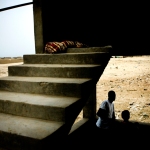
With Death as Companion
“We could hear the sirens night and day & day and night. After the third day, everything suddenly went quiet. Eleven of my friends jumped off the boat, they couldn’t handle the waiting, and they decided to swim for the shore. One by one we saw them disappear in the waves. They got eaten by the sea”. This tells Babacar Diops.
The up to 800 kilometers (500 miles) across the ocean takes place in small fishing boats packed with up to 90 migrants in each. The Spanish NGO “Organization for Human Rights in Andalusia” estimates that up to a thousand people died last year in their attempt to cross the sea.
Babacar Diops’s pale palms turn towards the sky. His eyes stands out like cracked china. Through the last year and a half, Babacar has seen fifteen of his friends die of hunger, deceases or drowning. First time was after four days in a small fishing boat riding a rough sea towards the Canary Islands. When the Spanish coastguard stopped the boat, Babacar couldn’t speak anymore.
“I was in the hospital for three days before I regained conscience. I was almost dead”. Four of the other 64 passengers never woke again.
For one week he was lying in a hospital bed, looking out of the window. Looking at Europe living it’s life, smelling the foreign country and listening to the sounds of another world. Then he was sent back home.
The police took him to the plane, the plane took him to Mauritania and Mauritania took him to jail. In his backpack he had €500, donated by the Spanish Red Cross. After 10 days in custody, he was given back to the streets. Both the backpack and the money had disappeared in the police storage.
One year after his first attempt, Babacar found himself mashed together with 73 other hopeful migrants in the bottom of a small wooden boat again trying for Europe. This time didn’t go as well as the first. They quickly lost their bearings and were left drifting the open sea for eight days in the hands of the North Atlantic currents before they by chance finally saw the coastline of Spain. But the coastguard were again blocking their way to the beaches of Las Palmas.
“The police threw us bundles of food and water, but they didn’t want to touch us. They only wanted to make sure we didn’t get any further”.
It took three days before desperation took over. Eleven of Babacar’s friends jumped overboard. They all drowned. After that the survivors where brought ashore. Two days later, they were back on a boat. This time they were going in the opposite direction. In Mauritania the police were waiting. The sentence was doubled, 20 days in the local internment camp nicknamed “Guantanamo”.
Today, only six months after he last looked death in the eyes, he’s again scouting the sea. Looking for the next boat there might take him to Europe.
“Clandestinos” living in an abandoned fish processing factory.
 Senegalese migrant preparing for the Muslim midday prayer in Nouadhibou’s shanty town.
Senegalese migrant preparing for the Muslim midday prayer in Nouadhibou’s shanty town.
 Nigerian migrant women have opened a small shop where they sow and sell their textiles in order to save money for the trip. The ticket can cost up to 1500 Euro.
Nigerian migrant women have opened a small shop where they sow and sell their textiles in order to save money for the trip. The ticket can cost up to 1500 Euro.
 28 migrants share a small four-room concrete house. Everybody shares the small amount of food that they can amass. The walls are full of pictures showing the latest European pop stars and footballers.
28 migrants share a small four-room concrete house. Everybody shares the small amount of food that they can amass. The walls are full of pictures showing the latest European pop stars and footballers.
 Tidiane Dialleo is 24 years old and from Senegal. He has been living in Nouadhibou for four years now, trying to save up enough money to buy a seat in one of the many small illegal boats crossing the 800 kilometer stretch to The Canary Islands. His only wish is to go to Europe and start a new life. As he says “I don´t know the life in Europe, I don´t know the people or the kindness. Maybe there, I can be a big man”.
Tidiane Dialleo is 24 years old and from Senegal. He has been living in Nouadhibou for four years now, trying to save up enough money to buy a seat in one of the many small illegal boats crossing the 800 kilometer stretch to The Canary Islands. His only wish is to go to Europe and start a new life. As he says “I don´t know the life in Europe, I don´t know the people or the kindness. Maybe there, I can be a big man”.
 The only Catholic Church in the Muslim country of Mauritania has become the meeting place for the migrants, both Christians and Muslims. The Church provides education and courses in how to survive in Europe and tries to train migrants in different occupations, such as cooking and computer skills.
The only Catholic Church in the Muslim country of Mauritania has become the meeting place for the migrants, both Christians and Muslims. The Church provides education and courses in how to survive in Europe and tries to train migrants in different occupations, such as cooking and computer skills.
 Tidiane is attending an English language exam, his only hope to survive in Europe, is to speak one or more of the European languages. The Catholic Church offers courses in English and Spanish.
Tidiane is attending an English language exam, his only hope to survive in Europe, is to speak one or more of the European languages. The Catholic Church offers courses in English and Spanish.
 The many migrants make it difficult to get a job. Often the migrants are stuck with the most dangerous jobs with the lowest wages. Here old shipwrecks are cut up and sold as scrap.
The many migrants make it difficult to get a job. Often the migrants are stuck with the most dangerous jobs with the lowest wages. Here old shipwrecks are cut up and sold as scrap.
 The beaches are filled with trash and packs of wild dogs roaming, living on the waste from the fishing boats.
The beaches are filled with trash and packs of wild dogs roaming, living on the waste from the fishing boats.
 Mauritania has sold many of its fishing quotas to richer nations, so the coastline is full of industry trawlers from China, Russia and Europe. As a fisher complains, “before the sea was full of squids and fish, now the only thing we catch is water”.
Mauritania has sold many of its fishing quotas to richer nations, so the coastline is full of industry trawlers from China, Russia and Europe. As a fisher complains, “before the sea was full of squids and fish, now the only thing we catch is water”.
 The gap between the city and the sea is a wasteland used for garbage disposal and housing for the poorest.
The gap between the city and the sea is a wasteland used for garbage disposal and housing for the poorest.

